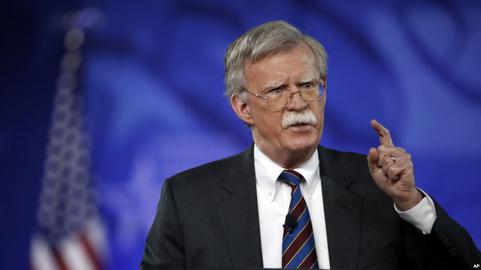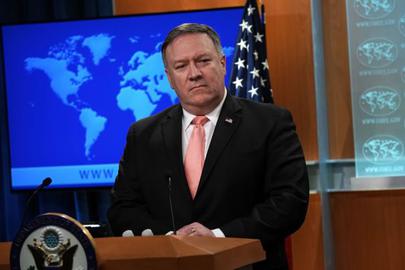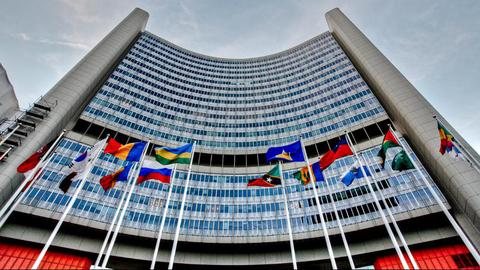In a press conference on Monday November 5, United States Secretary of State Mike Pompeo and Treasury Secretary Steven Mnuchin provided details on Washington’s new round of sanctions against Iran, which went into effect just hours before. The list targets more than 700 individuals and entities including 50 Iranian banks and their affiliates, insurance, shipping and energy companies, Iran Air and 67 of its aircrafts.
“The US has identified our respiratory canals and is trying to block them,” Iranian Foreign Minister Mohammad Javad Zarif told Iran’s Chamber of Commerce on June 23. Mnuchin’s list of new sanctions against Iran amounts to a realization of Zarif’s warning.
Iran is open to talks with the US if Trump changes the administration’s approach to the nuclear deal and adopts an attitude of “mutual respect,” Zarif told the newspaper USA Today in an interview on November 5, and comments from President Hassan Rouhani confirmed this. “When I was in New York, the leaders of four major powers were acting as go-betweens so that I would meet with the current US president,” Rouhani told a meeting at the Ministry of Economy and Finance. “But this does not need go-betweens and so many messages. Act according to your commitments and we will talk.”
The willingness of these two senior Iranian officials is, of course, contingent on preconditions. Their most important condition is that the US must rejoin the nuclear agreement, officially known as the Joint Comprehensive Plan of Action (JCPOA), from which President Trump withdrew on May 8 this year. The chances of this happening seem to be nil because the main goal of the US government in bringing back pre-JCPOA sanctions and imposing new ones is to force Iran into negotiations to reach a new agreement to replace the old one.
In a public speech on August 13, the Supreme Leader Ayatollah Khamenei emphasized that under present conditions negotiations would be against Iranian interests, and added: “We certainly are not going to negotiate with the current American administration.” Considering this public announcement and others similar to it, it is extremely unlikely that this time around Khamenei will be able to go back on his words by demonstrating “heroic flexibility” and approving negotiations with the US.
As things stand, perhaps Iran’s best hope for negotiations in the short term lies with the end of Trump’s presidency — a point that was also made on Monday by President Rouhani: “It is not us who want the rule of this US administration to draw closer and closer to its end. Their own European allies have told me in meetings that this is what they wish.” So the most reasonable assumption is that there will be no public negotiations between Iran and the US at least until 2021 when, perhaps, a new president might succeed Donald Trump.
“America will Regret it”
If that is the case, then the important question is this: Is the Iranian government ready to control the crisis until then? Rouhani’s answer to this question has been positive. “The US has only two goals,” he said on November 5. “It wants to weaken Iran and to rob Iranians of hope but it will achieve neither...We can make America regret [its decision], we can return foreign capital to our country and we can overcome inflation.”
But US officials describe the new sanctions as “devastating” and will push the Iranian economy further toward collapse. Secretary Pompeo warned that the US will exert "relentless" pressure on Iran unless it changes its "revolutionary course." "The Iranian regime has a choice: it can either do a 180-degree turn from its outlaw course of action and act like a normal country, or it can see its economy crumble,” he told reporters. And Trump’s National Security Advisor John Bolton has said that more sanctions are on their way in the coming months.
It is clear that the confrontation between the US and Iran has now gone beyond the “the war of the wills.” The US has shown that it has the willpower to re-impose and extend sanctions and the Islamic Republic has claimed that it has the will to withstand the American pressure. Economy is the real battlefield of this war and time will show whether the calculations made by one side or the other in this costly and dangerous process will bear out or not.
Related Coverage:
The Cost of Iran’s Stubborn Refusal to Join International Treaties, November 5, 2018
The Humanitarian Cost of Sanctions on Parsian Bank, October 23, 2018
, October 8, 2018
Families and Fishermen Lose Out as Prices Rise, October 1, 2018
Government Refuses to Listen as Currency Nosedive Continues, September 27, 2018
The Fall and Fall (and Fall) of Iranian Currency, September 12, 2018
The Diaper Crisis in Iran: An American Conspiracy?, September 7, 2018
Iran’s Medicine Shortage: More About Corruption and Mismanagement Than Sanctions, September 7, 2018
Can Iran Survive the Inflation Hike?, August 29, 2018
Parliament Grills Rouhani in Public Session, August 28, 2018
Rouhani's U-Turn to Save Economy, August 10, 2018
Iran Appoints New Bank Governor as Freefall Continues, August 6, 2018
Iranian Protesters: Death to High Prices!, July 31, 2018
The Fall and Fall of the Iranian Rial, July 31, 2018
visit the accountability section
In this section of Iran Wire, you can contact the officials and launch your campaign for various problems


























comments